|
|
|
Sort Order |
|
|
|
Items / Page
|
|
|
|
|
|
|
| Srl | Item |
| 1 |
ID:
161661
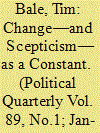

|
|
|
|
|
| Summary/Abstract |
Tony King had a healthy disrespect for conventional wisdom but a deep appreciation for common sense. Drawing on an eclectic mix of sources, both qualitative and quantitative, he wore his learning lightly, the better to highlight and explain to academic and non‐academic audiences how shifts in society and public opinion drove change inside parties and in the party systems in which they operated. King asked great questions and provided answers that simultaneously captured complexity and the big picture. His provocative interpretations and analysis were always stimulating—and many of them proved highly prescient.
|
|
|
|
|
|
|
|
|
|
|
|
|
|
|
|
| 2 |
ID:
092369
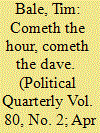

|
|
|
|
|
| Publication |
2009.
|
| Summary/Abstract |
While one can overstate the extent to which the Conservative party has changed since 2005, especially in the light of its response to the recession, the upturn in its electoral prospects is undeniable. Not surprisingly, the Conservative leader, David Cameron, is widely credited with turning around his party's fortunes. In fact, he started with several advantages over his predecessors: New Labour was well past its prime; the economy was running into trouble; and an increasingly desperate Conservative party was more willing to listen to the message that it needed to modernise and moderate. That said, Cameron has been crucial. His communication skills are unparalleled. Early success bought him time and 'permission to be heard'. Most important though, has been his determination-despite media criticism-to stick with a staged strategy focused on conveying change and a move to the centre ground while at the same time reassuring and dividing the Tory right.
|
|
|
|
|
|
|
|
|
|
|
|
|
|
|
|
| 3 |
ID:
123771


|
|
|
| 4 |
ID:
089647


|
|
|
|
|
| Edition |
2nd ed
|
| Publication |
Houndmills, Palgrave Macmillan, 2008.
|
| Description |
xvi, 404p.
|
| Standard Number |
9780230573796
|
|
|
|
|
|
|
|
|
|
|
|
Copies: C:1/I:0,R:0,Q:0
Circulation
| Accession# | Call# | Current Location | Status | Policy | Location |
| 054285 | 320.309422/BAL 054285 | Main | On Shelf | General | |
|
|
|
|
| 5 |
ID:
107206


|
|
|
|
|
| Publication |
2011.
|
| Summary/Abstract |
The May 2010 general election represented a change in tone on immigration and asylum policy for the Conservative party. Although its manifesto still contained a promise to limit numbers and expressed concern about the abuse of student visas, the Party's previous fixation with asylum seekers had disappeared. This article considers the rationale for these developments in the light of David Cameron's election as leader in late 2005 and his efforts from then on to reposition his party. Cameron's initial silence on this issue and his appointment of a moderate as immigration spokesman were part of an attempt both to shift the focus onto the economic impact of migration and, more broadly, to 'decontaminate the Tory brand' in order to gain 'permission to be heard' by small-l liberals who were critical to the Party's electoral recovery but alienated by hard-line stances. That said, immigration was never entirely forgotten even in this early period and was always seen, so long as it was carefully handled, as an issue capable of benefitting the Tories. As such, it was skilfully factored back into the Party's offer from late 2007 onwards. In government, the Conservatives may have the upper hand on immigration over their junior coalition partner, but this is no guarantee that they will be able to deliver the outcomes they promised
|
|
|
|
|
|
|
|
|
|
|
|
|
|
|
|
| 6 |
ID:
105869
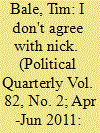

|
|
|
|
|
| Publication |
2011.
|
| Summary/Abstract |
Insider and journalistic accounts of the formation in May 2010 of the Conservative-Liberal Democrat coalition actually, although not explicitly, rely on types of explanation familiar to those who study politics. They tell us that structure (or at least the economy) was important. So too, they suggest, were institutions (timing and the rules of the game). They also stress the importance of contingency ('events, dear boy, events') and agency (who did and said what to whom). While none of these things were unimportant, they only served to make certain an outcome that anyone with a passing acquaintance with the theory and the practice of coalition formation would have predicted-namely a 'minimum winning coalition'. The only thing that could have made that outcome uncertain was a fundamental ideological difference between the two parties involved; however, it quickly became apparent-to the surprise of those of us who failed to appreciate how much the Liberal Democrats had changed-that no such difference existed. Indeed, it is possible to argue that the coalition formed was not merely minimum winning but 'minimum connected winning'. As such, its formation was not so much breathtakingly bold and exciting as pretty much inevitable. In the end, the maths and the physics mattered more than the chemistry. Fortunately for the Conservatives, the Liberal Democrats seriously underplayed their hand in the negotiations, with possibly disastrous consequences for them in the long term.
|
|
|
|
|
|
|
|
|
|
|
|
|
|
|
|
| 7 |
ID:
144827


|
|
|
| 8 |
ID:
095294
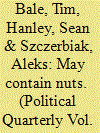

|
|
|
|
|
| Publication |
2010.
|
| Summary/Abstract |
The British Conservative Party's decision to leave the European Peoples' Party-European Democrats (EPP-ED) group in the European Parliament and establish a new formation-the European Conservatives and Reformists (ECR)-has attracted criticism, much of it focused on the supposedly extremist politics and character of the partners with which the Conservatives have chosen to work. In fact, while those parties which have joined the Conservatives in the new group are for the most part socially conservative, they are less extreme and more pragmatic than their media caricatures suggest. Moreover, such caricatures obscure some interesting incompatibilities within the new group as a whole and between some of its Central and East European members and the Conservatives, not least with regard to their foreign policy preoccupations and their by no means wholly hostile attitude to the European integration project.
|
|
|
|
|
|
|
|
|
|
|
|
|
|
|
|
| 9 |
ID:
091739
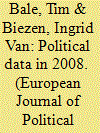

|
|
|
| 10 |
ID:
070816


|
|
|
| 11 |
ID:
135881


|
|
|
|
|
| Summary/Abstract |
Under pressure from voters, and from other parties, Europe's centre-left has had to re-evaluate its position on migration. The UK Labour party is no exception. Public concern about large-scale immigration clearly contributed to its heavy defeat at the 2010 general election. Since then it has been slowly but surely hardening its stance on the issue, although this is by no means unprecedented: while the rise of UKIP may have upped the ante in recent months, Labour has a long history of adjusting policy in this area so as to remain competitive with its main rival, the Conservative party. Labour is now asking itself whether it will be possible to do this without challenging one of the fundamental precepts of EU membership—the right of free movement of people. Whatever the result of this internal debate between the party's ‘beer drinkers’ and its ‘wine drinkers’, Labour may still have difficulty in neutralising immigration as an issue since, for the most part, it continues to insist on giving an essentially economic answer to what for many voters is actually a cultural question.
|
|
|
|
|
|
|
|
|
|
|
|
|
|
|
|
| 12 |
ID:
138281


|
|
|
|
|
| Summary/Abstract |
The chances of Labour winning the 2015 general election with a comfortable overall majority are vanishingly small. It could, however, emerge as the largest party or finish just a handful of seats behind the Conservatives. Either scenario would give it at least a chance—and a bigger chance than many realise, we argue—of forming a government. In that event, Labour may be faced with a choice between getting together with another party (or parties) to form a majority coalition or else forming a minority government (either on its own or with one or more partners), which could assemble different majorities for different pieces of legislation or try to negotiate a ‘confidence and supply’ agreement. Given the precedents from the UK and overseas, we argue that, faced with this dilemma, Labour should do all it can to form a majority coalition. We also argue that Labour can learn some useful lessons from the Cameron–Clegg coalition.
|
|
|
|
|
|
|
|
|
|
|
|
|
|
|
|
|
|
|
|
|